八年级英语晨读手册
八下英语名师测控晨读手册第2单元范文
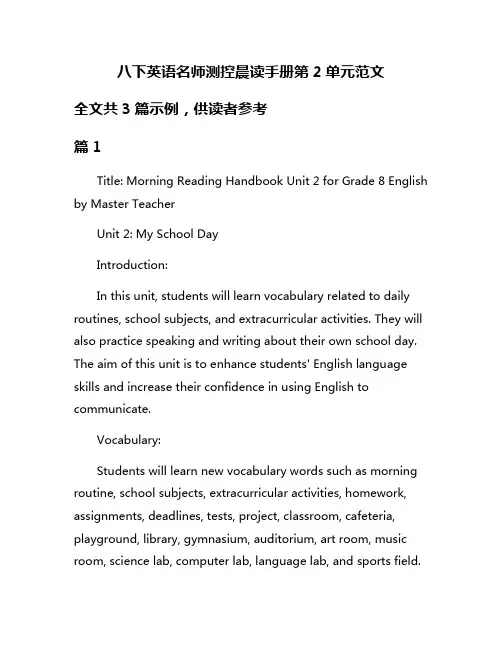
八下英语名师测控晨读手册第2单元范文全文共3篇示例,供读者参考篇1Title: Morning Reading Handbook Unit 2 for Grade 8 English by Master TeacherUnit 2: My School DayIntroduction:In this unit, students will learn vocabulary related to daily routines, school subjects, and extracurricular activities. They will also practice speaking and writing about their own school day. The aim of this unit is to enhance students' English language skills and increase their confidence in using English to communicate.Vocabulary:Students will learn new vocabulary words such as morning routine, school subjects, extracurricular activities, homework, assignments, deadlines, tests, project, classroom, cafeteria, playground, library, gymnasium, auditorium, art room, music room, science lab, computer lab, language lab, and sports field.Grammar:Students will practice using verbs in present simple tense to talk about their daily routines and activities. They will also practice using prepositions of place to describe the location of different school facilities and rooms.Speaking:Students will have opportunities to practice speaking about their school day, including their morning routine, school subjects, extracurricular activities, and favorite parts of the school day. They will also practice asking and answering questions about their school day and discussing their schedules with classmates.Writing:Students will practice writing paragraphs about their school day, including information about their morning routine, school subjects, extracurricular activities, and feelings about different parts of the school day. They will also practice writing short essays about their favorite school subjects, extracurricular activities, and school facilities.Conclusion:By the end of this unit, students will have improved their English language skills and be able to confidently communicateabout their school day in English. They will have expanded their vocabulary, improved their grammar, and gained practice in speaking and writing about their own experiences. This unit will help students become more proficient in English and better prepared to succeed in their academic studies.篇2Title: Morning Reading Manual for 8th Grade English by Famous Teachers Unit 2Unit 2 in the 8th-grade English morning reading manual by famous teachers focuses on the theme of "Exploring Nature." In this unit, students are encouraged to deepen their understanding of the natural world by reading various texts, discussing different aspects of nature, and engaging in activities that connect them with the environment.The unit begins with an introduction to the importance of nature in our lives and the benefits of exploring it. Students are introduced to different ecosystems, such as forests, deserts, and oceans, and learn about the diverse flora and fauna that inhabit these environments. They also explore the concept of biodiversity and its significance in maintaining a healthy ecosystem.One of the key texts in this unit is a poem titled "The Voice of Nature" by John Keats. This poem captures the beauty and power of nature and encourages students to appreciate the wonders of the natural world. Through analyzing the poem, students develop their language skills and deepen their appreciation for nature.In addition to reading texts, students are also engaged in activities that allow them to connect with nature. For example, they may be asked to go on a nature walk, observe the wildlife in their local area, or create a nature journal to document their observations. These activities not only enhance students' understanding of nature but also foster a sense of curiosity and wonder about the world around them.Overall, Unit 2 in the morning reading manual for 8th-grade English by famous teachers is a valuable resource for students to explore the beauty and complexity of nature. By reading texts, engaging in discussions, and participating in activities, students develop a deeper appreciation for the natural world and are inspired to protect and preserve it for future generations.篇3Title: Unit 2 Morning Reading Handbook for Grade 8 EnglishUnit 2 of the Grade 8 English Morning Reading Handbook is designed to help students improve their reading comprehension skills through a series of carefully selected texts and exercises. This unit focuses on a variety of topics, including science, history, and literature, in order to broaden students' knowledge and vocabulary.The first text in this unit is an excerpt from a science article about the importance of recycling. Students are introduced to the concept of recycling and learn about the benefits it can have on the environment. They are also asked to answer questions about the text to test their understanding and critical thinking skills.The second text in this unit is a historical article about the Industrial Revolution. Students are given a brief overview of this important period in history and are asked to identify key events and figures from the text. This exercise helps students develop their ability to extract information from a text and understand its main ideas.The final text in this unit is a short story called "The Gift of the Magi" by O. Henry. This classic tale teaches students about the true meaning of selflessness and sacrifice. After reading the story, students are asked to analyze the characters' motivationsand actions, as well as their own thoughts and reactions to the story.Overall, Unit 2 of the Grade 8 English Morning Reading Handbook provides students with a diverse selection of texts and exercises to enhance their reading skills. By engaging with a variety of topics and genres, students are able to expand their vocabulary, improve their comprehension, and deepen their appreciation for literature and the world around them.。
2019秋人教新课标八年级英语上册晨读手册(无答案)
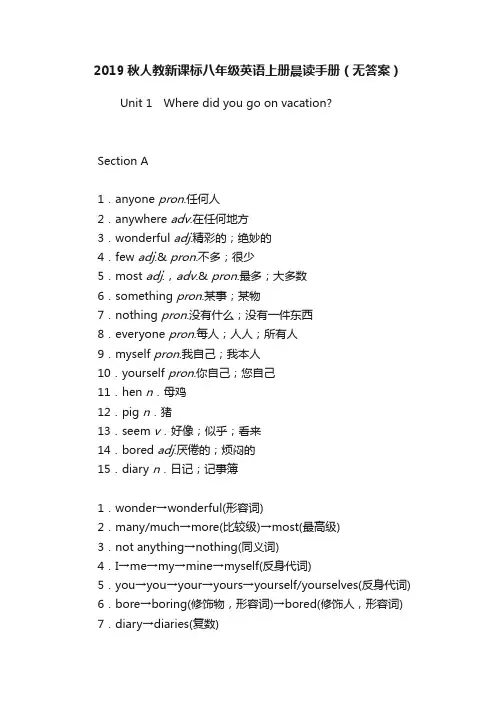
2019秋人教新课标八年级英语上册晨读手册(无答案)Unit 1 Where did you go on vacation?Section A1.anyone pron.任何人2.anywhere adv.在任何地方3.wonderful adj.精彩的;绝妙的4.few adj.& pron.不多;很少5.most adj.,adv.& pron.最多;大多数6.something pron.某事;某物7.nothing pron.没有什么;没有一件东西8.everyone pron.每人;人人;所有人9.myself pron.我自己;我本人10.yourself pron.你自己;您自己11.hen n.母鸡12.pig n.猪13.seem v.好像;似乎;看来14.bored adj.厌倦的;烦闷的15.diary n.日记;记事簿1.wonder→wonderful(形容词)2.many/much→more(比较级)→most(最高级)3.not anything→nothing(同义词)4.I→me→my→mine→myself(反身代词)5.you→you→your→yours→yourself/yourselves(反身代词) 6.bore→boring(修饰物,形容词)→bored(修饰人,形容词) 7.diary→diaries(复数)1.go on vacation 去度假2.stay at home待在家里3.go to the mountains去爬山4.go to the beach去海滩5.visit museums参观博物馆6.go to summer camp去参加夏令营7.quite a few相当多;不少8.study for为……而学习9.go out出去10.most of the time大部分时间11.taste good尝起来好吃12.have a good time玩得高兴13.go shopping去购物14.of course当然;自然15.take photos照相1.Where did you go on vacation?你去哪儿度假了?2.Long time no see.好久不见。
八年级下册英语人教版 重点词汇短语句型总结 晨读手册
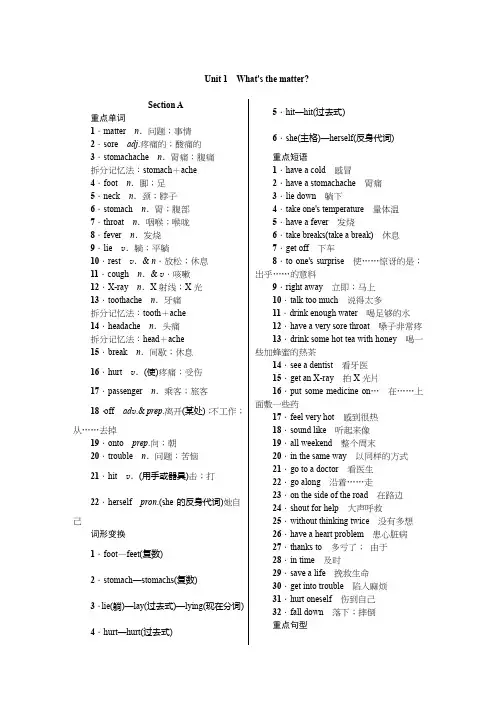
Unit 1What's the matter?Section A重点单词1.matter n.问题;事情2.sore adj.疼痛的;酸痛的3.stomachache n.胃痛;腹痛拆分记忆法:stomach+ache4.foot n.脚;足5.neck n.颈;脖子6.stomach n.胃;腹部7.throat n.咽喉;喉咙8.fever n.发烧9.lie v.躺;平躺10.rest v.& n.放松;休息11.cough n.& v.咳嗽12.Xray n.X射线;X光13.toothache n.牙痛拆分记忆法:tooth+ache14.headache n.头痛拆分记忆法:head+ache15.break n.间歇;休息16.hurt v.(使)疼痛;受伤17.passenger n.乘客;旅客18.off ad v.& prep.离开(某处);不工作;从……去掉19.onto prep.向;朝20.trouble n.问题;苦恼21.hit v.(用手或器具)击;打22.herself pron.(she的反身代词)她自己词形变换1.foot—feet(复数)2.stomach—stomachs(复数)3.lie(躺)—lay(过去式)—lying(现在分词)4.hurt—hurt(过去式)5.hit—hit(过去式)6.she(主格)—herself(反身代词)重点短语1.have a cold感冒2.have a stomachache胃痛3.lie down躺下4.take one's temperature量体温5.have a fever发烧6.take breaks(take a break)休息7.get off下车8.to one's surprise使……惊讶的是;出乎……的意料9.right away立即;马上10.talk too much说得太多11.drink enough water喝足够的水12.have a very sore throat嗓子非常疼13.drink some hot tea with honey喝一些加蜂蜜的热茶14.see a dentist看牙医15.get an Xray拍X光片16.put some medicine on…在……上面敷一些药17.feel very hot感到很热18.sound like听起来像19.all weekend整个周末20.in the same way以同样的方式21.go to a doctor看医生22.go along沿着……走23.on the side of the road在路边24.shout for help大声呼救25.without thinking twice没有多想26.have a heart problem患心脏病27.thanks to多亏了;由于28.in time及时29.save a life挽救生命30.get into trouble陷入麻烦31.hurt oneself伤到自己32.fall down落下;摔倒重点句型1.你怎么了?What's the matter with you?=What's the trouble with you?=What's wrong with you?2.她昨天说话太多,并且没喝足够的水。
初中英语八年级下册Unit 9 晨读本
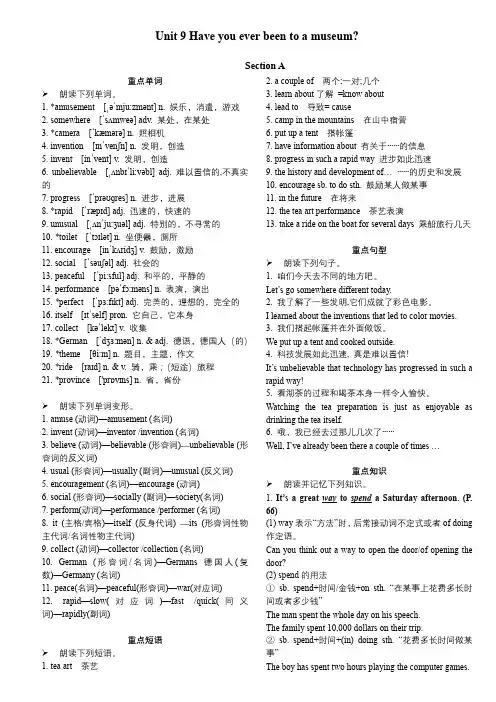
Unit 9 Have you ever been to a museum?Section A重点单词➢朗读下列单词。
1. *amusement [ˌəˈmju:zmənt] n. 娱乐,消遣,游戏2. somewhere [ˈsʌmweə] adv. 某处,在某处3. *camera [ˈkæmərə] n. 照相机4. invention [ɪnˈvenʃn] n. 发明,创造5. invent [inˈvent] v. 发明,创造6. unbelievable [ˌʌnbɪˈli:vəbl] adj. 难以置信的,不真实的7. progress [ˈprəʊɡres] n. 进步,进展8. *rapid [ˈræpɪd] adj. 迅速的,快速的9. unusual [ˌʌnˈju:ʒuəl] adj. 特别的,不寻常的10. *toilet [ˈtɔɪlət] n. 坐便器,厕所11. encourage [inˈkʌridʒ] v. 鼓励,激励12. social [ˈsəuʃəl] adj. 社会的13. peaceful [ˈpi:sful] adj. 和平的,平静的14. performance [pəˈfɔ:məns] n. 表演,演出15. *perfect [ˈpɜ:fɪkt] adj. 完美的,理想的,完全的16. itself [ɪtˈself] pron. 它自己,它本身17. collect [kəˈlekt] v. 收集18. *German [ˈdʒɜ:mən] n. & adj. 德语,德国人(的)19. *theme [θi:m] n. 题目,主题,作文20. *ride [raɪd] n. & v. 骑,乘;(短途)旅程21. *province ['prɒvɪns] n. 省,省份➢朗读下列单词变形。
1. amuse (动词)—amusement (名词)2. invent (动词)—inventor /invention (名词)3. believe (动词)—believable (形容词)—unbelievable (形容词的反义词)4. usual (形容词)—usually (副词)—unusual (反义词)5. encouragement (名词)—encourage (动词)6. social (形容词)—socially (副词)—society(名词)7. perform(动词)—performance /performer (名词)8. it (主格/宾格)—itself (反身代词) —its (形容词性物主代词/名词性物主代词)9. collect (动词)—collector /collection (名词)10. German (形容词/名词)—Germans 德国人(复数)—Germany (名词)11. peace(名词)—peaceful(形容词)—war(对应词)12. rapid—slow(对应词)—fast /quick(同义词)—rapidly(副词)重点短语➢朗读下列短语。
人教版八年级英语下册Unit 6 晨读本
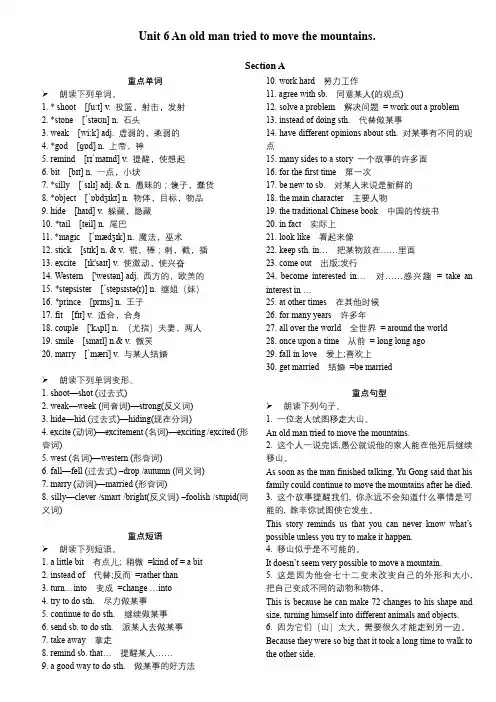
Unit 6 An old man tried to move the mountains.Section A重点单词➢朗读下列单词。
1. * shoot [ʃu:t] v. 投篮,射击,发射2. *stone [ˈstəʊn] n. 石头3. weak [wi:k] adj. 虚弱的,柔弱的4. *god [ɡɒd] n. 上帝,神5. remind [rɪˈmaɪnd] v. 提醒,使想起6. bit [bɪt] n. 一点,小块7. *silly [ˈsɪlɪ] adj. & n. 愚昧的;傻子,蠢货8. *object [ˈɒbdʒɪkt] n. 物体,目标,物品9. hide [haɪd] v. 躲藏,隐藏10. *tail [teil] n. 尾巴11. *magic [ˈmædʒɪk] n. 魔法,巫术12. stick [stɪk] n. & v. 棍,棒;刺,戳,插13. excite [ɪk'saɪt] v. 使激动,使兴奋14. Western ['westən] adj. 西方的,欧美的15. *stepsister [ˈstepsɪstə(r)] n. 继姐(妹)16. *prince [prɪns] n. 王子17. fit [fɪt] v. 适合,合身18. couple ['kʌpl] n. (尤指)夫妻,两人19. smile [smaɪl] n.& v. 微笑20. marry [ˈmæri] v. 与某人结婚➢朗读下列单词变形。
1. shoot—shot (过去式)2. weak—week (同音词)—strong(反义词)3. hide—hid (过去式)—hiding(现在分词)4. excite (动词)—excitement (名词)—exciting /excited (形容词)5. west (名词)—western (形容词)6. fall—fell (过去式) –drop /autumn (同义词)7. marry (动词)—married (形容词)8. silly—clever /smart /bright(反义词) –foolish /stupid(同义词)重点短语➢朗读下列短语。
人教版八年级英语下册Unit 2 晨读本
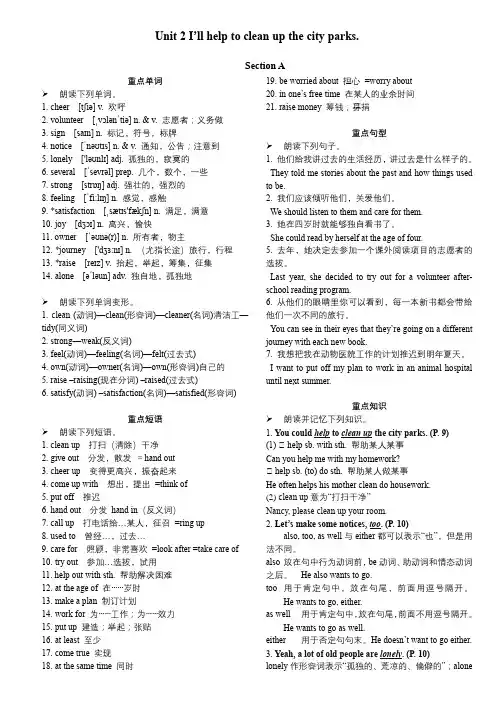
Unit 2 I’ll help to clean up the city parks.Section A重点单词➢朗读下列单词。
1. cheer [tʃiə] v. 欢呼2. volunteer [ˌvɔlənˈtiə] n. & v. 志愿者;义务做3. sign [saɪn] n. 标记,符号,标牌4. notice [ˈnəʊtɪs] n. & v. 通知,公告;注意到5. lonely ['ləʊnlɪ] adj. 孤独的,寂寞的6. several [ˈsevrəl] prep. 几个,数个,一些7. strong [strɒŋ] adj. 强壮的,强烈的8. feeling [ˈfi:lɪŋ] n. 感觉,感触9. *satisfaction [ˌsætɪs'fækʃn] n. 满足,满意10. joy [dʒɔɪ] n. 高兴,愉快11. owner [ˈəʊnə(r)] n. 所有者,物主12. *journey ['dʒɜ:nɪ] n. (尤指长途)旅行,行程13. *raise [reɪz] v. 抬起,举起,筹集,征集14. alone [əˈləun] adv. 独自地,孤独地➢朗读下列单词变形。
1. clean (动词)—clean(形容词)—cleaner(名词)清洁工—tidy(同义词)2. strong—weak(反义词)3. feel(动词)—feeling(名词)—felt(过去式)4. own(动词)—owner(名词)—own(形容词)自己的5. raise –raising(现在分词) –raised(过去式)6. satisfy(动词) –satisfaction(名词)—satisfied(形容词)重点短语➢朗读下列短语。
1. clean up 打扫(清除)干净2. give out 分发,散发=hand out3. cheer up 变得更高兴,振奋起来4. come up with 想出,提出=think of5. put off 推迟6. hand out 分发hand in(反义词)7. call up 打电话给…某人,征召=ring up8. used to 曾经…,过去…9. care for 照顾,非常喜欢=look after =take care of10. try out 参加…选拔,试用11. help out with sth. 帮助解决困难12. at the age of 在……岁时13. make a plan 制订计划14. work for 为……工作;为……效力15. put up 建造;举起;张贴16. at least 至少17. come true 实现18. at the same time 同时19. be worried about 担心=worry about20. in one’s free time 在某人的业余时间21. raise money 筹钱;募捐重点句型➢朗读下列句子。
八年级下册英语晨读手册第二单元范文
八年级下册英语晨读手册第二单元范文全文共3篇示例,供读者参考篇1Title: Morning Reading Manual for Grade 8 Unit 2Introduction:Welcome to the morning reading manual for Grade 8 Unit 2! In this unit, we will focus on a variety of topics such as technology, social media, and the impact they have on our daily lives. Through reading and discussing these topics, we hope to promote critical thinking, enhance language skills, and foster a deeper understanding of the world around us.Reading Passage 1: The Influence of Technology on EducationTechnology has revolutionized the way we learn and access information. With the rise of online resources, students can now study anytime and anywhere. This has led to a more personalized learning experience and has enabled students to learn at their own pace. However, critics argue that technology can be a distraction in the classroom and may hinder concentration. It is important for educators to strike a balance between usingtechnology as a tool for learning and ensuring that students are engaged and focused.Reading Passage 2: The Role of Social Media in SocietySocial media has become an integral part of our daily lives, allowing us to connect with friends and family, share our thoughts and experiences, and stay informed about current events. However, excessive use of social media has been linked to negative effects such as decreased productivity, poor mental health, and cyberbullying. It is important for individuals to use social media responsibly and to be mindful of its impact on their well-being.Discussion Questions:1. How has technology changed the way we learn in the classroom?2. What are some potential benefits and drawbacks of using social media?3. How can we use technology and social media in a responsible and balanced way?Conclusion:As we navigate the digital age, it is important to be mindful of the impact of technology and social media on our lives. By engaging in discussions, reflecting on the implications of these tools, and making conscious choices about their usage, we can harness their potential for positive change and personal growth. We hope that this morning reading manual has provided you with valuable insights and encouraged you to think critically about the role of technology and social media in the modern world. Thank you for joining us in this journey of discovery and learning!篇2Title: Unit 2 Morning Reading Guide for Grade 8 English TextbookIntroduction:In the second unit of the Grade 8 English textbook, students will delve into various topics focusing on communication and social interactions. This unit will help students enhance their language skills and cultivate a deeper understanding of effective communication in different contexts. The morning reading guide is designed to provide additional practice and support for students to reinforce their learning.Body:The morning reading guide for Unit 2 includes a variety of activities that aim to improve students' reading comprehension, vocabulary, grammar, and writing skills. Each activity is carefully crafted to align with the learning objectives of the unit and help students attain the necessary language proficiency.Reading Comprehension:The reading comprehension activities in the morning reading guide consist of passages on various topics related to communication and social interactions. Students are required to read the passages carefully, understand the main ideas, and answer questions to demonstrate their comprehension skills. These exercises help students develop critical thinking skills and improve their ability to extract information from texts.Vocabulary:Vocabulary exercises in the morning reading guide focus on introducing new words and phrases related to the unit's theme. Students are tasked with learning the meanings of new vocabulary items, using them in sentences, and matching them with their corresponding definitions. These activities helpstudents expand their vocabulary and enhance their language proficiency.Grammar:The grammar exercises in the morning reading guide target specific grammar rules and structures that are relevant to the unit. Students are given practice exercises on tenses, articles, pronouns, and other grammar concepts to reinforce their understanding and application of English grammar rules. These exercises help students improve their writing skills and accuracy in using English grammar.Writing:The writing activities in the morning reading guide encourage students to practice their writing skills by responding to prompts related to the unit's topics. Students are required to write short essays, letters, and dialogues to express their ideas and opinions on communication and social interactions. These writing exercises help students enhance their composition skills and develop their ability to communicate effectively in written English.Conclusion:The morning reading guide for Unit 2 of the Grade 8 English textbook is a valuable resource for students to enhance their language skills and deepen their understanding of effective communication. By engaging in the reading comprehension, vocabulary, grammar, and writing activities provided in the guide, students can improve their proficiency in English and become more confident and competent communicators.篇3The following is a text about the second unit of the morning reading manual for the eighth grade English class:Unit 2: Making PlansDuring this unit, students will engage in activities that focus on making plans for the future. The unit will cover topics such as setting goals, making schedules, and discussing aspirations. Students will have the opportunity to practice their English language skills through reading, writing, and speaking exercises.The first part of the unit will involve discussing personal goals and aspirations. Students will be encouraged to think about what they hope to achieve in the future and how they can work towards accomplishing their goals. This will help them develop their vocabulary related to future plans and ambitions.In the second part of the unit, students will learn how to make schedules and plan their time effectively. They will practice using time-related vocabulary and phrases to discuss daily routines and future plans. Through a series of exercises and activities, students will learn how to prioritize tasks and organize their time efficiently.The final part of the unit will focus on making plans with others. Students will practice making arrangements and discussing future events with friends and family members. They will learn how to use modal verbs like 'will', 'can', and 'might' to make suggestions and propose ideas.Overall, this unit aims to help students improve their English language skills while also teaching them valuable life skills related to goal setting, time management, and effective communication. By the end of the unit, students will be able to confidently discuss their plans for the future and communicate effectively with others about upcoming events and commitments.。
林恩英语晨读初二晨读
林恩英语晨读初二晨读Good morning, everyone! It's time for our morning reading session. Let's start by reading a short passage about the importance of reading.Reading is an essential skill that plays a crucial role in our lives. It not only helps us acquire knowledge but also improves our critical thinking and communication skills. By reading, we can explore new ideas, travel to different places, and gain insights into diverse cultures.Reading also enhances our vocabulary and language proficiency. When we encounter new words and phrases in a book, we can look them up and learn how to use them in context. This not only makes us better readers but also better communicators.Furthermore, reading can be a source of relaxation and entertainment. Whether it's a gripping novel, an informative article, or a thought-provoking essay, the act of reading allows us to escape from the stresses of daily life and immerse ourselves in a world of imagination and creativity.In conclusion, reading is a valuable habit that enriches our lives in numerous ways. It is a tool for learning, a means of self-improvement, and a source of joy. Let's make reading a priority in our daily routine and reap the many benefits it has to offer.早上好,大家!现在是我们的晨读时间。
初中英语八年级下册Unit 10 晨读本
Unit 10 I've had this bike for three years.Section A重点单词➢朗读下列单词。
1. *yard [jɑ:d] n. 院子2. *sweet [swi:t] adj. & n. 甜的,糖果3. memory [ˈmemərɪ] n. 记忆,记忆力,回忆4. *cent [sent] n. 分,分币5. *toy [tɔɪ] n. 玩具6. *bear [bɛə] n. 熊7. *maker [ˈmeɪkə(r)] n. 生产者,制造者8. *scarf [skɑ:f] n. 围巾,披巾,头巾9. *soft [sɔft] adj. 柔软的10. check [tʃek] n. & v. 餐馆账单;检查11. *board [bɔ:d] n. 板子,甲板12. *junior [ˈdʒu:nɪə(r)] adj. 地位低下的13. clear [klɪə] v. 清除,清理14. *bedroom [ˈbedru:m] n. 卧室15. own [əun] v. 拥有;有16. *railway [ˈreɪlweɪ] n. 铁路,铁道17. part [pɑ:t] v. 离开;分开18. certain [ˈsə:tn] adj. 某一,确定的,无疑的19. honest [ˈɒnɪst] adj. 诚实的,正直的20. while [wail] conj. 当...时候,一段时间,一会儿21. *truthful [ˈtru:θfl] adj. 诚实的,真实的22. hometown [ˈhəʊmtaʊn] n. 家乡,故乡➢朗读下列单词变形。
1. sale (名词)—sell (动词)2. toy (名词)—toys (复数)3. make (动词)—maker (名词)4. junior (形容词)—senior (对应词)5. own (动词)—owner (名词)6. certain (形容词)—certainly (副词)7. honest (形容词)—dishonest (反义词)—honesty (名词)8. true (形容词)—truth (名词)—truthful (形容词)—truly(副词)9. sweet –candy (同义词)—sour(对应词)10. scarf—scarfs /scarves (复数)11. hard—soft(对应词)重点短语➢朗读下列短语。
八年级英语上册Unit1Wheredidyougoonvacation早读手册素材人教版
【题目要求】
假设你的名字叫小明。你很喜欢旅游,你和家人去年夏天去了长城。请以“The visit to the Great Wall” 为题,写一篇不少于80词的英语短文。
【优秀范文】
The visit to the Great Wall
My name is Xiaoming and I like traveling very much. Last summar, I went to the Great Wall with my family.
quite a few相当多
study for为……而学习
go out出去
most of the time大部分时间
taste good尝起来很好吃
have a good time=have fun
of course当然
feel like像……的感觉;想要
go shopping去购物
in the past在过去
5.我们看见来自于100多年前中国商人的房子。
We saw the house of Chinese traders from 100 years ago.
6. 我们想要爬上山顶,但是就开始下小雨,以此我们决定坐火车去。
We wanted to walk up to the top, but then it started raining a little so we decide to take the train.
7.我们等了一个多小时的车,因为有太多的人。
We waited over an hour for the train, because there were too many people.
8.由于糟糕的天气,我不能看见下面的任何事物。
- 1、下载文档前请自行甄别文档内容的完整性,平台不提供额外的编辑、内容补充、找答案等附加服务。
- 2、"仅部分预览"的文档,不可在线预览部分如存在完整性等问题,可反馈申请退款(可完整预览的文档不适用该条件!)。
- 3、如文档侵犯您的权益,请联系客服反馈,我们会尽快为您处理(人工客服工作时间:9:00-18:30)。
Unit 1 Where did you go on vacation? Unit1 短语1.呆在家里stay at home2.去爬山go to the mountains3.去夏令营 go to summer camp4.去度假go on vacation5.相当多 quite a few6.玩的高兴 have a good time\ have fun\ enjoy oneself7.到达 arrive in\ at8.决定做某事 decide to do sth9.去沙滩 go to the beach10.尽力做某事 try to do sth11.一些特别的东西 something special12.在过去 in the past13.享受做某事 enjoy doing sth14.想要做某事 want to do sthe15.开始做某事 start to do\ doing sth16.太多(加可数名词复数)to many17.太多(加不可数名词)to much18.太 (形容词、副词)much too19.因为(加单词、短语)because of20.在学校旅行中 on the school trip21.查清楚,弄明白 find out22.如此…、、以至于 so …、 that23.告诉某人去做某事 tell sb to do sth24.保持做某事 keep doing sth25.跳上跳下 jump up and down26.20 分钟后 twenty minutes later\ after twenty minutes27.感觉想要做某事 feeling like doing sth28.最后5小时 the last five hours29.给某人买某物 buy sth for sb\ buy sb sth30.额外两小时、再两小时 another two hours2d conversation:R: Hi, Helen、 Long time no see、H: Hi,Rick、 Yes, I was on vacation last month、R: Oh, did you go anywhere interesting?H: Yes, I went to Guizhou with my family、R: Wow! Did you see Huangguoshu Waterfall?H: Yes, I did、 It was wonderful! We took quite a few photos there、 What about you? Did you do anything special last month?R: Not really、 I just stayed at home most of the time to read and relax、Unit 1 Grammar focusWhere did you go on vacation? I went to New York City、Did you go out with anyone? No、 No one was here、 Everyone was on vacation、Did you buy anything special Yes, I bought something for my father、/ No, I bought nothing、How was the food? Everything tasted really good、Did everyone have a good time? Oh, yes、 Everything was excellent、Unit 2 How often do you exercise?Unit 2重点短语1.多久一次how often2.多少个小时how many hours3、一周一次once a week4、一个月两次twice a month5、什么类型的舞蹈what kind of dance6、熬夜到很晚stay up late7、吃一顿健康的早餐eat a healthy breakfast8、对…有益,有好处be good for9、根本不,一点儿也不not … at all10、问题的答案the answer to the question11、最好的休息方式the best way to relax12、帮忙(做)家务help with housework13、去购物go shopping14、在某人的业余时间in one’s free time15、询问某人关于某事ask sb about sth16、至少at least17、使用网络use the Internet18、比如,例如for example19、与某人共度时光spend time with sb20、一个16岁的学生 a 16-year-old student21、多于,超过more than22、许多好习惯 a lot of good habits23、去瞧牙医go to the dentist24、瞧电影go to the movies25、想要某人做某事want sb to do sth2d conversation:A:Hi,Claire,are you free next week?B:Hmm… next week is quite full for me,Jack、A:Really? How come?B:I have dance and piano lessons、A:What kind of dance are you learning?、B:Oh,swing dance、 It’s fun! I have class once a week,every MondayA:How often do you have piano lessons?B:Twice a week,on Wednesday and Friday、A:Well,how about Tuesday?B:Oh,I have to play tennis with my friends、But do you want to come?A:Sure、Unit 2 Grammar focusWhat do you usually do on weekends? I always exercise、What do they do on weekends? They often help with housework、What does she do on weekends? She sometimes goes shopping、How often do you go to the movies? I go to the movies maybe once a month、How often does he watch TV? He hardly ever watches TV、Do you go shopping? No, I never go shopping、n my sister、Unit 3 I’m more outgoing thaUnit 3 重点短语1 一些新的东西 something new2、努力工作 work hard3 在某方面有天赋 be talented in4 擅长 be good at\ do well in5 关心,在乎 care about6 使某人做某事 make sb do sth7 喜欢做某事 like doing\ to do8 在课上 in class9 对于某人来说做某事怎么样 It is + adj + for sb + to do sth10 只要 as long as11 与…不同 be different from12 帮某人做某事 help sb to do \ do sth13 使显现 bring out14 与…一样 the same as15 事实上 in fact16 讨论某事 talk about sth17 拿…有办法,善于应付… be good with、、 at18 给…、打…、电话 call …19 与…、、一样……… as…、、 as ……20 与…、相似2d conversation:A:Did you like the singing competition yesterday,Anna?B:Oh,it was fantastic! Nelly sang so well!A:Well,I think Lisa sang better than Nelly、B:Oh,which one was Lisa?A:The one with shorter hair、I think she sang more clearly than Nelly、B:Yes,but Nelly danced better than Lisa、A:You can tell that Lisa really wanted to win,though、B:Well,everyone wants to win、But the most important thing is to learn something new and have fun、Unit 3 Grammar focusIs Tom smarter than Sam? No, he isn’t、 Sam is smarter than Tom、、 Tina is more outgoing than Tara、Is Tara more outgoing than Tina? No, she isn’tAre you as friendly as your sister? No, I’m not、、 I’m friendlierDoes Tara work as hard as Tina? Y es, she does、Who’s more hard-working at school? Tina thinks she works harder than me、Unit 4 What’s the best movie theater?Unit 4重点短语1.the closest to home 离家最近2.so far 到目前为止3.Thanks for telling me、谢谢您告诉我4.No problem 没问题5.What do you think of 、、、、、、您认为、、、怎么样6.have 、、、、、 in common 有相同特征7.look for 寻找(指动作)8.all kinds of 各种各样9.be up to 由、、、决定10 play a role 发挥作用,有影响11 made up 编造12 for example 例如(接句子)13 take 、、、、、 seriously 认真对待14 come true 实现15 not、、、、 at all 一点也不16 how far 多远17 in town 在城镇18 It has the worst service 它有最糟的服务19 You can buy tickets the most quickly there、您可以从那最快的买票20 What is the best movie theater to go to 要去的最好的电影院就是什么?2d conversation:Greg: Hi, I'm Greg、 I'm new in town、Helen: Hi, I'm Helen、 Welcome to the neighborhood! How do you like it so far?Greg: It's fantastic, but I still don't really know my way around、Helen: Well, the best supermarket is on Center Street、 You can buy the freshest food there、Greg: Oh, great、 Is there a cinema around here? I love watching movies、Helen: Yes, Sun Cinema is the newest one、 You can sit the most comfortably because they have the biggest seats、Greg: Thanks for telling me、Helen: No problem、Unit 4 Grammar focusWhat’s the best movie theater to go to ?、 And you can buy tickets the most quickly Town Cinema、 It’s the closest to homethere?Which is the worst clothes store in town?、 It has the worst service、Dream Clothes、 It’s worse than Blue MoonWhat do you think of 970 AM?I think 970 AM is pretty bad、 It has worst music、Unit 5 Do you want to watch a game show ? Unit 5重点短语1.您认为…怎么样 What do you think of \ How do you like2.像…、学习 learn from3.计划做某事 plan to do4.希望做某事 hope to do5.查明,弄清 find out6.继续;发生 go on7.全世界around the world8.讨论…、、 talk about sth9.期待做某事 expect to do sth10.某一天 one day11.在20 世纪30 年代 in the 1930s12.尽力做某事 try to do13.面对任何困难 face any danger14.例如(加名词、动名词)such as15.准备好做某事be ready to do16.一双,一对 a pair of17.一种…的象征 a simple of18.出来,出版 come out19.尽某人最大努力 try one’s best20.乔装打扮成。
